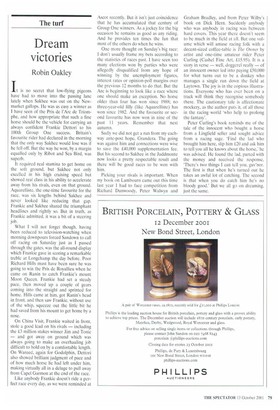Dream victories
Robin Oakley
It is no secret that low-flying pigeons have had to move into the passing lane lately when Sakhee was out on the Newmarket gallops. He was as easy a winner as I have seen of the Prix de l'Arc de Triomphe, and how appropriate that such a fine horse should be the vehicle for carrying an always confident Frankie Dettori to his 100th Group One success. Britain's favourite rider had declared in the morning that the only way Sakhee would lose was if he fell off. But the way he won, by a margin equalled only by Ribot and Sea Bird, was superb.
It required real stamina to get home on the soft ground, but Sakhee not only excelled in his high cruising speed but showed real class in his ability to accelerate away from his rivals, even on that ground. Aquarelliste, the one-time favourite for the race, was six lengths behind Sakhee and never looked like reducing that gap. Frankie and Sakhee shared the triumphant headlines and rightly so. But in truth, as Frankie admitted, it was a bit of a steering job.
What I will not forget though, having been reduced to television-watching when morning downpours forced Sandown to call off racing on Saturday just as I passed through the gates, was the all-round display which Frankie gave in scoring a remarkable treble at Longchamp the day before. Poor Richard Hills must have been sure he was going to win the Prix de Royallieu when he came on Ranin to catch Frankie's mount Moon Queen. Frankie had set a steady pace, then moved up a couple of gears coming into the straight and sprinted for home. Hills came at him, got Ranin's head in front, and then saw Frankie, without use of the whip, squeeze out the little bit he had saved from his mount to get home by a nose.
On China Visit, Frankie waited in front, stole a good lead on his rivals — including the £3 million stakes winner Jim and Tonic — and got away on ground which was always going to make an overhauling job difficult to hold on by a comfortable length. On Wareed, again for Godolphin, Dettori also showed brilliant judgment of pace and of how much horse he had left under him, making virtually all in a deluge to pull away from Capel Garmon at the end of the race.
Like anybody Frankie doesn't ride a perfect race every day, as we were reminded at Ascot recently. But it isn't just coincidence that he has accumulated that century of Group One winners. As a jockey for the big occasion he remains as good as any riding. And he provides ten times the fun that most of the others do when he wins.
One more thought on Sunday's big race: I don't usually frame my bets according to the statistics of races past. I have seen too many elections won by parties who were allegedly disqualified from any hope of winning by the unemployment figures, interest rates or opinion-poll margins over the previous 12 months to do that. But the Arc is beginning to look like a race where one should make an exception. No horse older than four has won since 1988; no three-year-old filly (like Aquarelliste) has won since 1982. And the favourite or second favourite has now won in nine of the past 11 years. Remember that next autumn.
Sadly we did not get a run from my eachway ante-post hope, Grandera. The going was against him and connections were wise to save the £40,000 supplementation fee. But his second to Sakhee in the Juddmonte now looks a pretty respectable result and there will be good races to be won with him.
Picking your rivals is important. When my book on Lambourn came out this time last year I had to face competition from Richard Dunwoody, Peter Walwyn and
Graham Bradley, and from Peter Wilby's book on Dick Hem. Suddenly anybody who was anybody in racing was between hard covers. This year there doesn't seem to be much in the field at all. But one volume which will amuse racing folk with a decent-sized coffee-table is The Owner by artist and one-time amateur rider Peter Curling (Cashel Fine Art, £15.95). It is a story in verse — well, doggerel really — of an innocent owner led into paying £50,000 for what turns out to be a donkey who manages a single run down the field at Laytown. The joy is in the copious illustrations. Everyone who has ever been on a track will think they recognise somebody there. The cautionary tale is affectionate mockery, as the author puts it, of all those in the racing world who help to prolong the fantasy'.
Peter Curling's book reminds me of the tale of the innocent who bought a horse from a Lingfield seller and sought advice from a racing sage. 'Find the lad who brought him here, slip him £20 and ask him to tell you all he knows about the horse,' he was advised. He found the lad, parted with the money and received the response, 'There's two things I can tell you, guy'nor. The first is that when he's turned out he takes an awful lot of catching. The second is that when you do catch him he's no bloody good.' But we all go on dreaming, just the same.


























































































 Previous page
Previous page